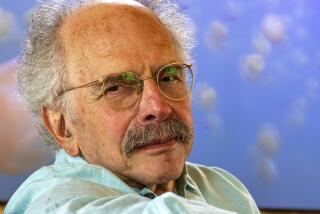On the Corporate Stage, Delivery Is Everything
- Share via
With his reverence for Buddhism and the pre-Socratics, Robert Dickman might seem unlikely to spend much time chatting with high-level corporate executives, especially at a time when Enron and other scandals have public confidence in corporate integrity at a new low. But the 56-year-old Santa Monica resident looks to the multinationals to make the world a better place. Dickman’s firm, FirstVoice Communications, has consulted at Ford Motor Co., Mattel and SAIC, a defense firm, among other industry giants. Dickman, who studied Zen Buddhism in Japan before becoming an actor and an acting and directing coach, realized he was a natural to bring better storytelling to the boardroom.
You call your storytelling formula PHAT?
Passion: The emotions of a story act as its primary anchor in memory. Hero: Does the story provide a clearly defined point of view? Antagonist: Are there obstacles that confront the hero? Transformation: Does the story have the power to change the life of the audience?
“Phat” is also a rapper term. Does that mean rappers are good storytellers?
Actually, it comes from a Tibetan monk, who, when he would waver in his meditation, would yell out really loud, “Phat!” to bring himself back.
Starting with the junk bond scandals and culminating in Enron, America has rediscovered its distrust of corporate power. Why should we care what a corporation has to say?
We’d better. It’s where all the resources are, all the money. Talent follows money. It’s certainly not in government anymore. These multinational corporations are starting to take the role of national governments. They are directing--tacitly as well as overtly--our foreign policy, social policy, environmental policy. I am an idealist, and as corrupt as some of these companies have been, there are things in place that make it possible for them to be the facilitators of positive change.
For one, these companies are talking to people that our governments are not. These companies are constantly doing business no matter what the governments are doing. They have connections that are not political, they have alliances that aren’t going to shift when a new government comes in. It behooves us to help these companies become more authentic and connect them to the universe of man. They don’t come to me to create disinformation. They may have vested a lot in a new idea and they hire me to help them to connect their idea to their target audience.
You talk about a great story being an idea wrapped in an emotion. What emotions drive corporate America?
On the negative side, there are fear and greed, but there are also courage, dedication and selflessness, going beyond themselves to help the team. It’s a slice of humanity. There are corporations that are only about making more money, no matter who they [hurt], but I am confident that catches up with them. Life is built on trust; ultimately I depend on you to trust me. People will start stopping to trust companies when they find they’re not doing what they’re saying.
Who are some of the unsung heroes?
I would cite BP. They’ve changed their name from British Petroleum to Beyond Petroleum and they got a tremendous amount of sand kicked in their faces from shareholders. But they’re looking at the big picture. They want to show they’re looking at alternative sources of energy. Another is Unilever. They’re really thinking about their relationship as global citizens. In India, for instance, they’ve gone into poor villages that everyone else had written off. First they went in and educated people about why it’s better for the health of the village to wash with soap, and how this would end dysentery. And then they sell the soap in affordable packets, for one rupee as opposed to 25 rupees.
So you’re optimistic about corporate America?
I think the pain level has to go up to make change. This has to be embraced. These are tough times. But I do have faith in the overall stability of this country. I think change is going to be occurring. The people I have dealt with at MIT [Dickman has a piece in the spring issue of the MIT publication Reflections], I call them the scary-smart people. They have models that show that in my life span, we could irrevocably screw up the environment. Right now we see ourselves too much in isolation. Those days are over.
More to Read
Inside the business of entertainment
The Wide Shot brings you news, analysis and insights on everything from streaming wars to production — and what it all means for the future.
You may occasionally receive promotional content from the Los Angeles Times.










